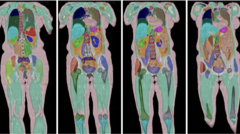How Did an Israeli Strike Claim the Life of a Father Searching for Water in Gaza?

The Tragic Reality of Water Scarcity and Violence in Gaza
The humanitarian crisis in Gaza has reached alarming levels, exacerbated by ongoing violence and severe water shortages. The story of Abdullah, a young boy who lost his life while simply searching for water, highlights the dire circumstances facing many civilians in this conflict-ridden region. As families like Abdullah's struggle to meet their basic needs amidst constant aggression, the international community is left grappling with the implications of these tragedies. This article delves into the multifaceted issues surrounding the water crisis in Gaza, the impact of military operations, and the urgent need for humanitarian intervention.
The Context of the Gaza Water Crisis
Gaza has long been a focal point of conflict, with its people enduring the effects of blockades, military actions, and a lack of essential resources. The United Nations has repeatedly highlighted the deteriorating conditions, particularly concerning access to clean water. In a region where water is already scarce, the ongoing violence has further strained the fragile infrastructure.
The Impact of the Blockade
Since 2007, Gaza has been under an Israeli blockade, which has severely limited the import of goods, including those necessary for maintaining water supply systems. This blockade has had several repercussions:
- Decreased Water Quality: With limited resources, water treatment facilities are unable to function effectively, leading to contamination and increased health risks.
- Infrastructure Damage: Military operations often target critical infrastructure, including water facilities, exacerbating the crisis.
- Inadequate Supply: Many residents receive less than the emergency standard of 15 liters of water per day, which is insufficient for basic hygiene and nutrition.
Desalination and Water Distribution Challenges
The ability to desalinate seawater has been touted as a potential solution to Gaza's water woes. However, several factors hinder this process:
- Fuel Shortages: The lack of fuel for generators necessary for desalination plants hampers their operations.
- Technical Failures: Many facilities are outdated and require spare parts that are often unavailable due to the blockade.
- Security Concerns: Ongoing military actions create an environment where water distribution becomes perilous, as evidenced by recent attacks on civilians queuing for water.
Abdullah's Story: A Harrowing Example
The tragic fate of Abdullah, who was killed while waiting for water, epitomizes the suffering endured by countless children in Gaza. His father, Mahmoud, recounts the harrowing moment, emphasizing the desperation of families in search of basic necessities. The attack not only claimed innocent lives but also shattered the dreams of young children who merely wished for a semblance of normalcy.
The Immediate Aftermath of the Attack
The incident involving Abdullah and other children highlights the indiscriminate nature of violence in conflict zones. Eyewitness accounts and graphic footage reveal the chaos following the airstrike, with families torn apart and communities left in despair. Al-Awda hospital reported numerous casualties, including children, underscoring the tragic toll of such military actions on civilian lives.
International Response and Accountability
The international community faces mounting pressure to address the humanitarian crisis in Gaza. Organizations like UNICEF and the UN have called for urgent reviews of military engagement rules to prevent further civilian casualties. However, the political complexities of the Israeli-Palestinian conflict often hinder decisive action.
The Role of Humanitarian Organizations
Humanitarian organizations play a crucial role in providing relief to those affected by the crisis:
- Emergency Aid: Many organizations are working to provide essential supplies, including food, water, and medical care.
- Advocacy: Groups advocate for an end to violence and improved access to humanitarian assistance, urging the international community to intervene.
- Education and Awareness: Raising awareness about the plight of Gazans is essential for garnering support and fostering understanding.
The Psychological Impact on Children
The ongoing violence and scarcity of resources take a significant toll on the mental health of children in Gaza. The trauma of witnessing violence, losing family members, and living in fear can have lasting effects on their development.
Children's Mental Health Statistics
Research indicates that children in conflict zones are at a higher risk of developing mental health disorders, including:
- Anxiety and Depression: Many children exhibit symptoms of anxiety and depression due to the constant threat of violence.
- Post-Traumatic Stress Disorder (PTSD): Exposure to traumatic events can lead to PTSD, affecting their ability to function normally.
- Behavioral Issues: Children may display aggressive behavior or withdrawal as they struggle to cope with their circumstances.
The Call for Change
The situation in Gaza demands urgent attention and action from the international community. Advocates call for a multipronged approach to address the humanitarian crisis and promote peace:
- End Military Operations: Reducing violence is essential to allow for humanitarian aid to reach those in need.
- Support for Water Infrastructure: Investing in sustainable water solutions and infrastructure repair is crucial for long-term relief.
- Engagement in Peace Talks: Diplomatic efforts must be intensified to find a resolution to the ongoing conflict.
Conclusion: A Plea for Humanity
The heartbreaking story of Abdullah and the daily struggles of families in Gaza highlight the urgent need for a comprehensive response to the humanitarian crisis. As the world watches, it is vital to remember that behind statistics and news reports are real lives—children with dreams, families with hopes, and a community yearning for peace. The time for action is now; each day that passes without intervention allows the cycle of violence and suffering to continue. Will we choose to turn a blind eye, or will we advocate for a future where children can thrive in safety?
FAQs
What is causing the water crisis in Gaza?
The water crisis in Gaza is primarily caused by a combination of a prolonged blockade, damage to infrastructure due to military operations, and a lack of resources for desalination and water treatment facilities.
How does the conflict affect children in Gaza?
Children in Gaza face severe psychological and physical risks due to ongoing violence, including increased rates of mental health disorders, trauma from witnessing violence, and loss of family members.
What can be done to help the situation in Gaza?
To help the situation in Gaza, there needs to be an end to military operations, increased humanitarian aid, investment in infrastructure, and renewed diplomatic efforts aimed at achieving peace.
The plight of children like Abdullah reminds us of the urgent need for humanitarian action. As we reflect on these realities, let us consider how we can contribute to a more compassionate and just world. #GazaCrisis #HumanRights #WaterScarcity
Published: 2025-07-14 21:02:09 | Category: world



